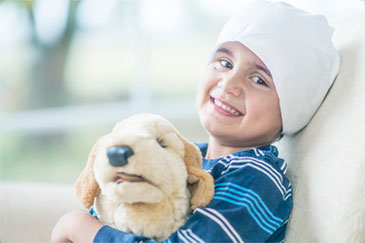- Home
- Research & Data
- POGONIS – Childhood Cancer Database
- Data Anatomy
- POGO Satellite Program Database
POGO Satellite Program Database
Description
POGO’s Provincial Pediatric Oncology Satellite Program transfers aspects of a child’s care, for eligible patients, to POGO Satellite Clinics in community hospitals closer to home. We collect and retain information in our POGO Satellite Program Database, which we maintain under the legislative authority of our Prescribed Entity designation through the Personal Health Information Protection Act, 2004 (PHIPA).
Statement of Purpose
What is the purpose of the data holding?
The purpose of this database is to securely store patient, visit and treatment information for POGO Satellite Program patients to support the transfer of care from the specialized childhood cancer program to the POGO Satellite Clinic, inform program planning and evaluation, conduct analysis and reporting for the Ministry of Health and for health system planning purposes. Data captured in the data holding are both linked and compared with POGO’s childhood cancer database, POGONIS, to ensure accuracy, facilitate additional analysis and support potential research endeavours.
What PHI is contained in the data holding?
The patient personal health information (PHI) contained in the data holding includes:
- First name, middle name and surname
- Date of birth
- Hospital-assigned medical record number (MRN)
- Date of death (if applicable)
What is the source of the PHI?
Local hospital-specific medical records are the source of PHI for the data holding and the information is inputted into the database by POGO Satellite Clinic Nurses.
Why is PHI needed in relation to the identified purpose?
PHI is required for the purposes of administering the program, enabling program planning, evaluation and improvement and verifying the accuracy of the POGONIS Registration ID for analysis and research through linkages.
The specialized childhood cancer programs search within the data holding by inputting one or more PHI data elements to identify whether the patient has been registered in POGONIS. Once a patient has been registered in POGONIS, the patient can be referred to one or more POGO Satellite Clinics. Once referred, the POGO Satellite Clinic(s) can access the patient’s record and input patient PHI data related to patient encounters.
The POGO Satellite Clinics may input a patient’s hospital-specific MRN and date of death (if applicable) to ensure consistency of the data holding with the local medical record.
Why won’t de-identified and/or aggregate information serve the identified purpose?
De-identified and/or aggregate information will not serve the identified purposes because:
- It cannot verify the accuracy of the POGONIS Registration ID which is necessary to facilitate analysis and research using linkages and
- The POGO Satellite Program Database is a patient-level, point-of-care database.
Contact Us
For any questions or concerns about the POGO Satellite Program Database, please contact satellite@pogo.ca.
We welcome requests for the use of the data in the POGO Satellite Program Database and other POGO PHI data holdings for analysis and/or research purposes.
POGO values privacy and protects the personal health information (PHI) of children and youth with cancer, survivors of childhood cancers and their families.
Related Articles
Paid Summer Internship for Childhood Cancer Survivors
January 3, 2025
Are you a childhood cancer survivor who is looking to gain valuable work experience in the…
Spotlight on Tanya Hobson: A Dedicated Advocate for Pediatric Oncology Families in Northern Ontario
December 16, 2024
Introducing Tanya For Tanya Hobson, a POGO nurse based at Health Sciences North in Sudbury, caring…
Reflective Practice IS Nursing Practice
December 16, 2024
By: Arvinder Aulakh, Jessica Brooks “Let us never consider ourselves finished nurses…we must be…
Highlights from the 2024 POGO Symposium: Through a Nurse’s Lens
December 16, 2024
By Denise Mills This year, the POGO Multidisciplinary Symposium on Childhood Cancer took an…
Evaluating Healthcare Simulation Escape Rooms as an Educational Tool in Nursing Continuing Education: A Fellowship Journey
December 16, 2024
By: Brennah Holley Fellowship Overview Brennah Holley, Clinical Nurse Educator at CHEO in Ottawa…
Improving the Experience: Innovating the Standard Blinatumomab Medical Backpack at SickKids
December 16, 2024
By: Alia Petropoulosand Lisa Honeyford Blinatumomab is an immunotherapy primarily used to treat…


YOU can be a champion for kids with cancer!
With your help, we will ensure that kids and youth with cancer, their families and survivors of childhood cancer have equitable access to the best care for the best possible outcomes.